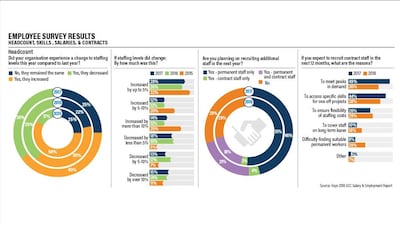While more than a third of GCC employers reduced their headcount in 2017, four in ten boosted their workforce, reflecting the highly polarised activity in the region’s jobs market, while sentiment for the year ahead is positive, according to the Hays 2018 GCC Salary & Employment Report.
About 35 per cent of GCC employers made staff cutbacks last year, a similar figure to the 39 per cent that reduced employee numbers in 2016. However, 40 per cent of firms boosted their workforce in 2017, again reflective of the 39 per cent reported in 2016, according to the survey.
The findings of the report, which surveyed 4,250 working professionals across the GCC in the fourth quarter of last year, are “clearly indicative of what we have been seeing in the GCC employment market,” said Chris Greaves, managing director of Hays Gulf Region.
“On the one hand, the continued diversification of the local economy away from its reliance on the oil and gas sector and the increasingly globalised nature of the market have brought many opportunities to businesses in the region, who are actively hiring additional staff in order to capitalise on these," he said.
However, the sustained low energy prices and increasing competition faced by organisations in all sectors, has resulted in employers taking a cautious approach to recruitment, Mr Greaves said.
Matt Stuart, the founder and managing director of Getabed, a UK hotel room wholesaler with over 40 employees globally and 11 based in Jumeirah Lake Towers in Dubai, said the company has cut its numbers by a third in the emirate within the last 12 months.
“We’ve made the cuts due to increasing costs of employment here – we’ve been looking at the cost of living increases over the next couple of years and the pressure that’s going to put on employers to raise wages at what for us would be at a unsustainable pace because our anticipated revenues would not keep up,” Mr Stuart said.
The introduction of VAT will put further inflationary pressure on the cost of employment, something that has encouraged the company to look at alternative jurisdictions and locations to recruit staff, he added.
“We anticipate the team reducing by another 20 per cent over the course of the next 12 months with those roles being redistributed elsewhere to other jurisdictions. We’ve opened an operational office in Romania so we are moving some of that operational headcount there because it will be more cost-effective for us,” Mr Stuart said.
______
Read more:
Almost half of UAE residents worried about increased living costs from VAT
UAE salaries: VAT set to eat into pay rises, new report says
UAE salary guide: How much should you be making?
______
Even at the lower end, such as clerical staff, when all costs of employment are considered such as size of office space, medical related, salaries, and flight tickets versus hiring the same staff member in another location, it becomes more cost-effective to shift roles elsewhere, Mr Stuart added.
Companies are increasingly selective towards hiring, with application processes that are more rigorous and prolonged than previous years, said Mr Greaves. Five per cent of working professionals said they were made redundant in 2017 while 29 per cent of started a new job with a new employer.
Another difference noted in the report was an increase in the number of roles offered on a contract rather than a permanent basis in 2017, due to cost efficiencies that can be gained by companies working on short-term deadlines, such as IT or technology projects. This allows employers to take on full-time employees without the costs of fully onboarding a permanent employee.
The outlook for 2018, however, is more positive, according to the study, with seven in 10 of those polled planning to recruit additional staff in the next 12 months and 66 per cent predicting market activity to increase year-on-year for their business.
In terms of salaries, the report found similar results to 2016 with 39 per cent of respondents reporting an increase in salary while just over half experienced no change and almost one in 10 receiving a decrease.
“Some companies are selectively targeting higher performers for above inflation pay rises, but for the third year running the single biggest explanation offered by our candidates for an increase in their pay in 2017 was ‘a new job with a new company’,” Mr Greaves wrote in the report.
The number of available jobs in 2018 was unlikely to reach the peaks experienced in 2015, however, hiring activity is expected to rise compared to 2017, he said. Sectors likely to benefit from this include the IT industry, due to the region’s increasing focus on e-commerce and digitalisation, and tax implementation specialists as VAT is rolled out across the GCC.
“The bang you get for your buck elsewhere, even in the UK, which is not considered a low cost location for employment, is significant," said Mr Stuart. "The costs of employing someone in the UK versus what that person will cost in Dubai, because of the inflationary pressures, is for us starting to reach a tipping point where we cannot justify and afford to have people here."
Killing of Qassem Suleimani
AUSTRALIA SQUAD
Aaron Finch (captain), Ashton Agar, Alex Carey, Pat Cummins, Glenn Maxwell, Ben McDermott, Kane Richardson, Steve Smith, Billy Stanlake, Mitchell Starc, Ashton Turner, Andrew Tye, David Warner, Adam Zampa
COMPANY%20PROFILE
%3Cp%3E%3Cstrong%3EName%3A%20%3C%2Fstrong%3EEjari%3Cbr%3E%3Cstrong%3EBased%3A%20%3C%2Fstrong%3ERiyadh%2C%20Saudi%20Arabia%3Cbr%3E%3Cstrong%3EFounders%3A%20%3C%2Fstrong%3EYazeed%20Al%20Shamsi%2C%20Fahad%20Albedah%2C%20Mohammed%20Alkhelewy%20and%20Khalid%20Almunif%3Cbr%3E%3Cstrong%3ESector%3A%20%3C%2Fstrong%3EPropTech%3Cbr%3E%3Cstrong%3ETotal%20funding%3A%20%3C%2Fstrong%3E%241%20million%3Cbr%3E%3Cstrong%3EInvestors%3A%20%3C%2Fstrong%3ESanabil%20500%20Mena%2C%20Hambro%20Perks'%20Oryx%20Fund%20and%20angel%20investors%3Cbr%3E%3Cstrong%3ENumber%20of%20employees%3A%20%3C%2Fstrong%3E8%3C%2Fp%3E%0A
Citadel: Honey Bunny first episode
Directors: Raj & DK
Stars: Varun Dhawan, Samantha Ruth Prabhu, Kashvi Majmundar, Kay Kay Menon
Rating: 4/5
UAE currency: the story behind the money in your pockets
THE POPE'S ITINERARY
Sunday, February 3, 2019 - Rome to Abu Dhabi
1pm: departure by plane from Rome / Fiumicino to Abu Dhabi
10pm: arrival at Abu Dhabi Presidential Airport
Monday, February 4
12pm: welcome ceremony at the main entrance of the Presidential Palace
12.20pm: visit Abu Dhabi Crown Prince at Presidential Palace
5pm: private meeting with Muslim Council of Elders at Sheikh Zayed Grand Mosque
6.10pm: Inter-religious in the Founder's Memorial
Tuesday, February 5 - Abu Dhabi to Rome
9.15am: private visit to undisclosed cathedral
10.30am: public mass at Zayed Sports City – with a homily by Pope Francis
12.40pm: farewell at Abu Dhabi Presidential Airport
1pm: departure by plane to Rome
5pm: arrival at the Rome / Ciampino International Airport
Results
Catchweight 60kg: Mohammed Al Katheeri (UAE) beat Mostafa El Hamy (EGY) TKO round 3
Light Heavyweight: Ibrahim El Sawi (EGY) no contest Kevin Oumar (COM) Unintentional knee by Oumer
Catchweight 73kg: Yazid Chouchane (ALG) beat Ahmad Al Boussairy (KUW) Unanimous decision
Featherweight: Faris Khaleel Asha (JOR) beat Yousef Al Housani (UAE) TKO in round 2 through foot injury
Welterweight: Omar Hussein (JOR) beat Yassin Najid (MAR); Split decision
Middleweight: Yousri Belgaroui (TUN) beat Sallah Eddine Dekhissi (MAR); Round-1 TKO
Lightweight: Abdullah Mohammed Ali Musalim (UAE) beat Medhat Hussein (EGY); Triangle choke submission
Welterweight: Abdulla Al Bousheiri (KUW) beat Sofiane Oudina (ALG); Triangle choke Round-1
Lightweight: Mohammad Yahya (UAE) beat Saleem Al Bakri (JOR); Unanimous decision
Bantamweight: Ali Taleb (IRQ) beat Nawras Abzakh (JOR); TKO round-2
Catchweight 63kg: Rany Saadeh (PAL) beat Abdel Ali Hariri (MAR); Unanimous decision
Killing of Qassem Suleimani
COMPANY PROFILE
Name: Xpanceo
Started: 2018
Founders: Roman Axelrod, Valentyn Volkov
Based: Dubai, UAE
Industry: Smart contact lenses, augmented/virtual reality
Funding: $40 million
Investor: Opportunity Venture (Asia)
UK-EU trade at a glance
EU fishing vessels guaranteed access to UK waters for 12 years
Co-operation on security initiatives and procurement of defence products
Youth experience scheme to work, study or volunteer in UK and EU countries
Smoother border management with use of e-gates
Cutting red tape on import and export of food
The specs: 2018 Nissan Altima
Price, base / as tested: Dh78,000 / Dh97,650
Engine: 2.5-litre in-line four-cylinder
Power: 182hp @ 6,000rpm
Torque: 244Nm @ 4,000rpm
Transmission: Continuously variable tranmission
Fuel consumption, combined: 7.6L / 100km
Company%C2%A0profile
%3Cp%3E%3Cstrong%3ECompany%20name%3A%20%3C%2Fstrong%3EOutsized%0D%3Cbr%3E%3Cstrong%3EStarted%3A%20%3C%2Fstrong%3E2016%0D%3Cbr%3E%3Cstrong%3EFounders%3A%20%3C%2Fstrong%3EAzeem%20Zainulbhai%2C%20Niclas%20Thelander%2C%20Anurag%20Bhalla%20and%20Johann%20van%20Niekerk%20%0D%3Cbr%3E%3Cstrong%3EBased%3A%20%3C%2Fstrong%3EIndia%2C%20South%20Africa%2C%20South-East%20Asia%2C%20Mena%0D%3Cbr%3E%3Cstrong%3ESector%3A%3C%2Fstrong%3E%20Recruitment%0D%3Cbr%3E%3Cstrong%3EInvestment%20raised%3A%3C%2Fstrong%3E%20%241%20million%0D%3Cbr%3E%3Cstrong%3ECurrent%20staff%20count%3A%3C%2Fstrong%3E%2040%0D%3Cbr%3E%3Cstrong%3EInvestors%3A%20%3C%2Fstrong%3ESeed%20and%20angel%20investors%0D%3Cbr%3E%3C%2Fp%3E%0A
The five pillars of Islam
1. Fasting
2. Prayer
3. Hajj
4. Shahada
5. Zakat
The End of Loneliness
Benedict Wells
Translated from the German by Charlotte Collins
Sceptre
england euro squad
Goalkeepers: Dean Henderson (Man Utd), Sam Johnstone (West Brom), Jordan Pickford (Everton)
Defenders: John Stones (Man City), Luke Shaw (Man Utd), Harry Maguire (Man Utd), Trent Alexander-Arnold (Liverpool), Kyle Walker (Man City), Tyrone Mings (Aston Villa), Reece James (Chelsea), Conor Coady (Wolves), Ben Chilwell (Chelsea), Kieran Trippier (Atletico Madrid)
Midfielders: Mason Mount (Chelsea), Declan Rice (West Ham), Jordan Henderson (Liverpool), Jude Bellingham (Borussia Dortmund), Kalvin Phillips (Leeds)
Forwards: Harry Kane (Tottenham), Marcus Rashford (Man Utd), Raheem Sterling (Man City), Dominic Calvert-Lewin (Everton), Phil Foden (Man City), Jack Grealish (Aston Villa), Jadon Sancho (Borussia Dortmund), Bukayo Saka (Arsenal)
Overview
Cricket World Cup League Two: Nepal, Oman, United States tri-series, Tribhuvan University, Kathmandu
Fixtures
Wednesday February 5, Oman v Nepal
Thursday, February 6, Oman v United States
Saturday, February 8, United States v Nepal
Sunday, February 9, Oman v Nepal
Tuesday, February 11, Oman v United States
Wednesday, February 12, United States v Nepal
UPI facts
More than 2.2 million Indian tourists arrived in UAE in 2023
More than 3.5 million Indians reside in UAE
Indian tourists can make purchases in UAE using rupee accounts in India through QR-code-based UPI real-time payment systems
Indian residents in UAE can use their non-resident NRO and NRE accounts held in Indian banks linked to a UAE mobile number for UPI transactions
Key facilities
- Olympic-size swimming pool with a split bulkhead for multi-use configurations, including water polo and 50m/25m training lanes
- Premier League-standard football pitch
- 400m Olympic running track
- NBA-spec basketball court with auditorium
- 600-seat auditorium
- Spaces for historical and cultural exploration
- An elevated football field that doubles as a helipad
- Specialist robotics and science laboratories
- AR and VR-enabled learning centres
- Disruption Lab and Research Centre for developing entrepreneurial skills
More coverage from the Future Forum



